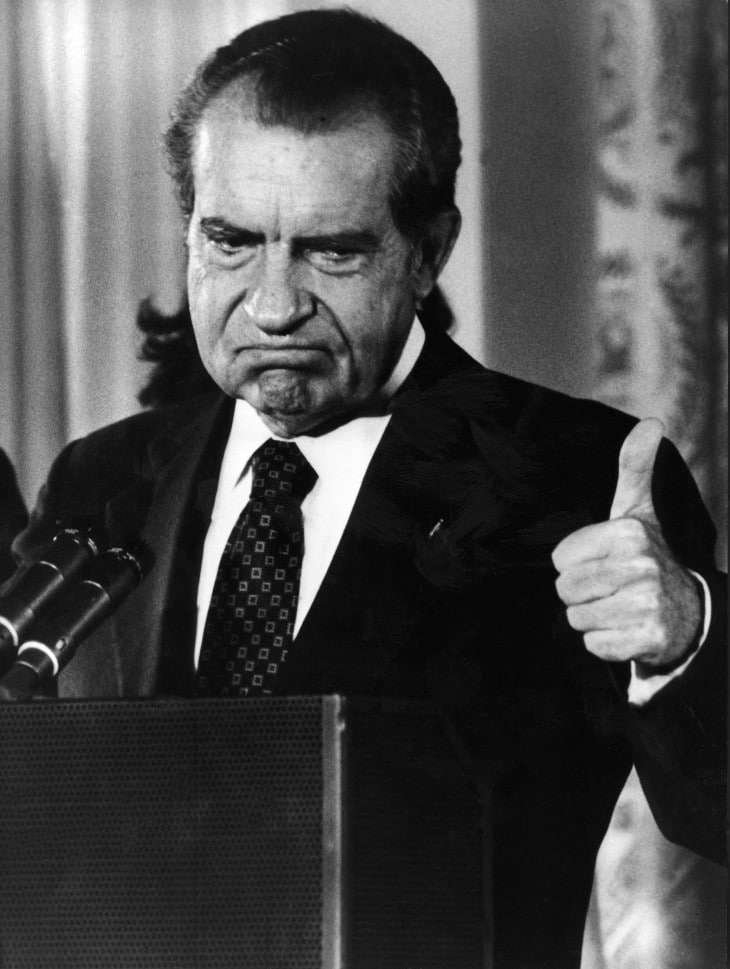The Volokh Conspiracy
Mostly law professors | Sometimes contrarian | Often libertarian | Always independent
Richard Nixon's exploitation of political ignorance

Politicians are often accused of adopting harmful policies to advance their reelection prospects. But in most cases, it's difficult to tell what their true motives are. Perhaps the leader in question genuinely believes that his policies are beneficial, even if the evidence proves otherwise.
A new article on Richard Nixon's decision to impose wage and price controls in 1971 provides a rare example of smoking gun evidence of this kind of behavior. Utilizing the Nixon tapes, economists Burton Abrams and James Butkiewicz show that Nixon chose to impose wage and price controls despite knowing full well that they would likely harm the economy. He did so because he thought the favorable publicity generated by the policy would help him get reelected in 1972. Here is the abstract:
In late July, 1971, Nixon reiterated his adamant opposition to wage and price controls calling them a scheme to socialize America. Yet, less than a month later, in a stunning reversal, he imposed the first and only peacetime wage and price controls in U.S. history. The Nixon tapes, personal tape recordings made during the presidency of Richard Nixon, provide a unique body of evidence to investigate the motivations for Nixon's stunning reversal. We uncover and report in this paper evidence that Nixon manipulated his New Economic Policy to help secure his reelection victory in 1972. He became convinced that wage and price controls were necessary to grab the headlines away from the defeatist abandonment of the Bretton Woods Agreement and the closing of the U.S. gold window. Nixon understood the impact of his wage and price controls, but chose to trade off longer term economic costs to the economy for his own short-term political gain.
Economist Emily Skarbek has some comments and additional excerpts from the article here.
Nixon's cynical gambit seems to have worked. The wage and price control policy was popular, and Nixon was reelected in a landslide (though other factors also influenced the outcome, including the weaknesses of Democratic candidate George McGovern).
This sequence of events raises an interesting question: If Nixon knew that the wage and price controls would have a negative effect on the economy, why would he expect the voters to reward rather than punish them for this policy? Why was able to get away with it?
The likely answer is that Nixon probably counted on widespread political ignorance to help him. Most voters know very little about politics and government generally, and economic policy specifically. A policy that seems to take decisive action to address a problem (in this case inflation) and apparently has positive short-term effects is likely to prove popular, even if it causes substantial long-term harm. When the long-term effects do become evident, voters may not even associate them with the policy decisions that caused them, a likelihood that clearly influenced Nixon, according to Abrams and Butkiewicz. Data from the around the world show that voters routinely reward and punish incumbents for short-term economic trends they did little to cause, while often overlooking policy outcomes for which they have greater responsibility.
Most skilled political leaders are aware of the realities of voter ignorance and do what they can to exploit them. Nixon was far from the last to peddle economic snake oil for political gain. Many other politicians on both sides of the political spectrum have done much the same thing. Donald Trump's immigration and trade policy stances are a particularly blatant recent example. If implemented, his proposed tariff increases would greatly damage the US economy, and harm many of the very workers he claims to want to help. But, from Trump's point of view, the long run economic harm might be outweighed by short-term political gains.
Unlike in the case of Nixon, it is often difficult to say whether Trump and other recent manipulators of public ignorance are being cynical. Most don't leave behind smoking guns like the Nixon tapes. Perhaps they genuinely believe their own rhetoric. Sadly, however, the harmful effects of their actions - and the public ignorance they exploit - are likely to be the same either way.


Show Comments (0)